Stylish new robes for ‘Messiah’: Andrew Davis leads Toronto CD in his modern orchestration
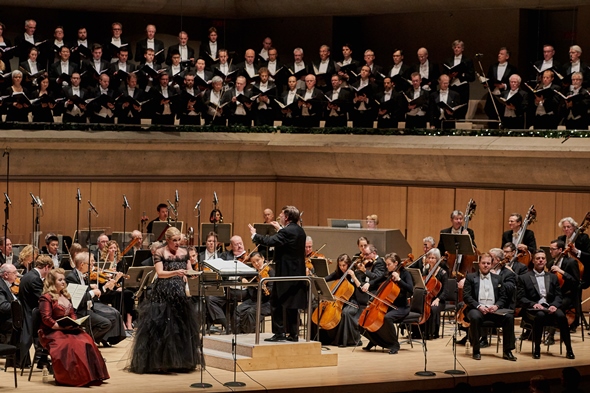 Review: Handel’s “Messiah,” concert edition by Andrew Davis, who leads the Toronto Symphony and Mendelssohn Choir (Chandos).
Review: Handel’s “Messiah,” concert edition by Andrew Davis, who leads the Toronto Symphony and Mendelssohn Choir (Chandos).
By Lawrence B. Johnson
To say the just-released recording of Handel’s “Messiah,” arranged and conducted by Andrew Davis with the Toronto Symphony Orchestra and Toronto Mendelssohn Choir, is unlike anything you’ve ever heard would be categorically true, down to the pictorial accents of harp, trombones and – yea, verily – marimba and tambourines.
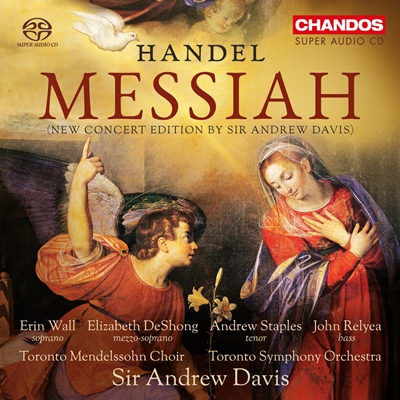 Davis, music director of the Lyric Opera of Chicago, holds the title of conductor laureate of the Toronto Symphony, an ensemble with which he has worked constantly for the last 43 years and for which he created this “new concert edition” of Handel’s beloved oratorio in 2010. By “concert” edition, Davis means just that: a performing version that utilizes the resources of a modern symphony orchestra. But left unsaid in that phrase, albeit quite evident upon hearing, is the conductor’s devotion to the Baroque spirit and stylistic framework of the original.
Davis, music director of the Lyric Opera of Chicago, holds the title of conductor laureate of the Toronto Symphony, an ensemble with which he has worked constantly for the last 43 years and for which he created this “new concert edition” of Handel’s beloved oratorio in 2010. By “concert” edition, Davis means just that: a performing version that utilizes the resources of a modern symphony orchestra. But left unsaid in that phrase, albeit quite evident upon hearing, is the conductor’s devotion to the Baroque spirit and stylistic framework of the original.
Only in scale is this new “Messiah” a throwback to the grandiose concepts that engulfed the work from the Victorian era up through the mid-20th century – before the renascence of historically informed performance practice. Nowhere to be found here is the opacity, the turgidity, the sheer musical bulk once common to “Messiah” re-writ large. In Davis’ finely wrought setting, clarity rings as smartly as the instrumental effects themselves; and that happy result, he says, was a cardinal objective.
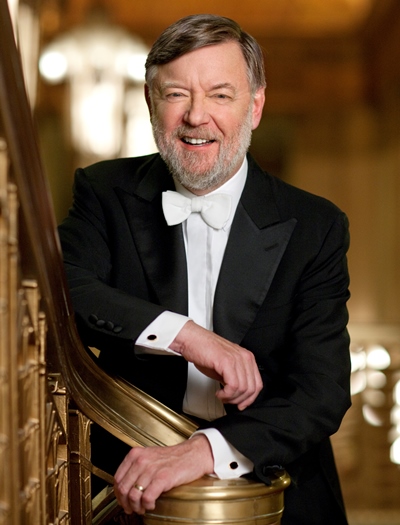 “So many people do really wonderful performance-practice, thoroughly Baroque ‘Messiahs,’ but I became obsessed with the idea of a new one in the line of (Thomas) Beecham and (Eugene) Goossens, but without the pomposity,” says Davis. “I had previously orchestrated Bach’s Passacaglia and Fugue in C minor and some chorale preludes, which I regarded as more Stravinsky than Stokowski. And I thought ‘Messiah’ also could be at once grand and precise.
“So many people do really wonderful performance-practice, thoroughly Baroque ‘Messiahs,’ but I became obsessed with the idea of a new one in the line of (Thomas) Beecham and (Eugene) Goossens, but without the pomposity,” says Davis. “I had previously orchestrated Bach’s Passacaglia and Fugue in C minor and some chorale preludes, which I regarded as more Stravinsky than Stokowski. And I thought ‘Messiah’ also could be at once grand and precise.
“The big moments are very grand, especially the ending. There’s lots of percussion – cymbal crashes in ‘Hallelujah’ and at the end of the ‘Amen’ chorus. Actually, I had second thoughts about some of the percussion and backed off a bit. I know Mozart’s arrangement (which emphasizes wind instruments) quite well, and I did pinch some things from him, but just here and there. In the chorus ‘All we like sheep,’ I couldn’t help thinking of Strauss’ ‘Alpine Symphony,’ so a bit of baahing crept in.”
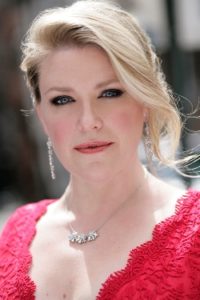 One mild shock comes in the Pifa, or Pastoral Symphony, typically heard as an expansive, becalmed interlude before the advent of angels with the message of Christ’s birth. Davis uses a foreshortened version that seems to occupy no more than the space of two deep breaths. “Handel preferred the shorter Pifa, which works more as a scene-setting than as a movement in itself,” the conductor says. Thus the narrative proceeds swiftly into the pivotal sequence from the recitative “There were shepherds abiding in the field” to the glittering aria “Rejoice greatly,” given silvery voice by soprano Erin Wall.
One mild shock comes in the Pifa, or Pastoral Symphony, typically heard as an expansive, becalmed interlude before the advent of angels with the message of Christ’s birth. Davis uses a foreshortened version that seems to occupy no more than the space of two deep breaths. “Handel preferred the shorter Pifa, which works more as a scene-setting than as a movement in itself,” the conductor says. Thus the narrative proceeds swiftly into the pivotal sequence from the recitative “There were shepherds abiding in the field” to the glittering aria “Rejoice greatly,” given silvery voice by soprano Erin Wall.
Vocally, this “Messiah” is indeed well provided. Mezzo-soprano Elizabeth DeShong’s rich contribution includes a poignant turn through “He was despised” and, with Wall, a meltingly beautiful duet “He shall feed His flock.” Tenor Andrew Staples sets the bar high with his inviting proclamation “Comfort ye, my people” and aria “Ev’ry valley shall be exalted.” And bass John Relyea brings imposing gravitas – as well as fetching agility – to simply everything.
(Both Wall and DeShong, by the way, are alums of the Lyric Opera’s Ryan Center training program. And Staples will star as Tamino in the upcoming Lyric production of Mozart’s “The Magic Flute,” which opens a holiday run Dec. 10 and continues through Jan. 27, 2017 — Mozart’s birthday!)
The splendid Toronto Mendelssohn Choir presents a compelling case for the clear-sightedness of Davis’ orchestral settings: The chorus, prepared by Noel Edison, delivers its rigorously contrapuntal assignment with a transparency uncorrupted by any excesses of orchestration. Handel’s great choruses such as “For unto us a Child is born,” “His yoke is easy” and “Lift up your heads” emerge as vibrant peaks in this glorious production.
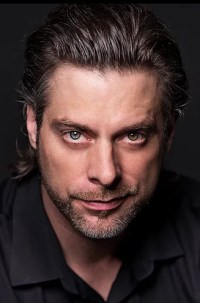 Then, of course, there is the orchestra, ground zero of Davis’ brash re-creation. The Toronto Symphony’s pin-point playing affirms his ear for the propulsive rhythms characteristic of early 18th-century music, just as the strings’ warm legato shows his willingness to break with that model when he prefers a singing line. Movement after movement, whether vivacious or ruminative, Davis has set a bold seal upon “Messiah.” He also knows there will be purists who ask: What planet is this guy living on?
Then, of course, there is the orchestra, ground zero of Davis’ brash re-creation. The Toronto Symphony’s pin-point playing affirms his ear for the propulsive rhythms characteristic of early 18th-century music, just as the strings’ warm legato shows his willingness to break with that model when he prefers a singing line. Movement after movement, whether vivacious or ruminative, Davis has set a bold seal upon “Messiah.” He also knows there will be purists who ask: What planet is this guy living on?
“I’m sure some people will be absolutely appalled by it, hate it,” Davis says. “Some will say it’s very interesting but blah-blah-blah. But I never for a moment stopped to ask whether I should be doing this. I did it for an orchestra where I have stood on the podium for 43 consecutive seasons. I’m actually proud of it.”
The Lyric Opera will host a meet-the-artist event at 4:30 p.m. Sunday, Dec. 4, when Davis will be on hand to sign copies of his new “Messiah” recording – or affix his signature to (nearly) anything else ink will adhere to. The two-disc CD set will be available for sale, though no purchase is required. With Davis will be bass Ferruccio Furlanetto, who sings the title role in the Lyric’s current production of Massenet’s “Don Quichotte,” conducted by Davis.
Tags: Andrew Staples, Elizabeth DeShong, Erin Wall, Eugene Goossens, John Relyea, Sir Andrew Davis, Thomas Beecham, Toronto Mendelssohn Choir

